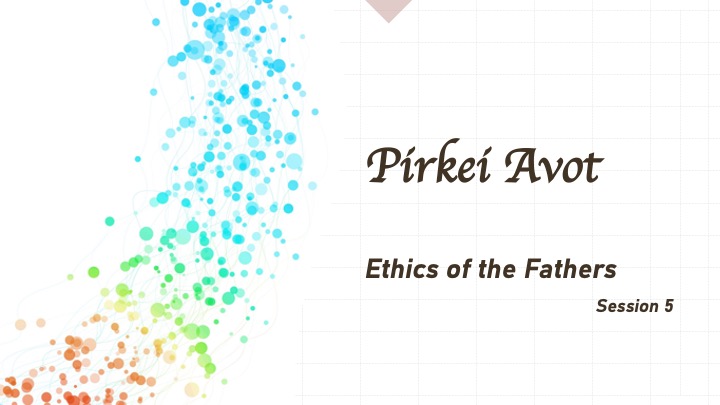Pirkei Avot Lesson 5
Sandy Kress

Ethics of the Fathers – Lesson Plan – Session Five
I. Introduction
II. Verses to Consider
A. Shimon says: All my days I have been raised among the Sages, and I have found nothing better for the body than silence; it is not the theory that is of primary importance, but the action; and one who talks excessively brings on sin. 1:17
Questions:
1. Our culture appears to preach the opposite - that one should be loud and showy and attention-getting. Is this true? Why would it be so? What does it think’s to be gained by this very different approach?
2. What’s the case for this different approach, one of silence? How could we be more silent, and how would that benefit us?
3. Shimon makes a distinct point about action. What might he mean by the action of silence? What might one do while silent? What might one not do while being silent?
B. Rabbi Shimon ben Gamliel says: The world endures on three things – justice, truth, and peace, as it is said: You shall adjudicate the verdict of truth and peace at your gates (Zechariah 8:16) 1:18
Questions:
1. Putting aside how this verse is understood alongside 1:2 (world endures on Bible, service, and lovingkindness), let me ask this: if these virtues are essential to our minimally keeping society on an even keel, explain how each of them works to do so, to keep society going, if not actually to strengthen it.
2. Is it important, even essential, that the three are listed together? If so, how do the three work together?
C. Rabbi says: Which is the proper path that a man should choose for himself? Whatever is a credit to himself and earns him the esteem of fellow men. 2:1
Questions:
1. This prominent sage makes a key point in the first sentence that is crucial for us to see and pick out. What is it, and why is it so important?
2. What would we imagine it to be – in the mind of a religious sage or even an ethical person of today – that brings credit to a person? And what should be our guide, our criteria for making that judgment?
3. Why would we care about the esteem of others? And what do we do if these two conflict, if what earns esteem of others goes against the standards by which we believe we’re brought credit?
III. Conclusion – what are our takeaways from study today?